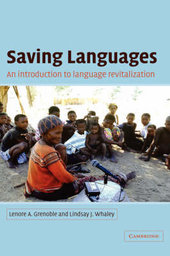
|
Saving Languages: An Introduction to Language Revitalization
Hardback
Main Details
| Title |
Saving Languages: An Introduction to Language Revitalization
|
| Authors and Contributors |
By (author) Lenore A. Grenoble
|
|
By (author) Lindsay J. Whaley
|
| Physical Properties |
| Format:Hardback | | Pages:244 | | Dimensions(mm): Height 235,Width 158 |
|
| Category/Genre | Sociolinguistics |
|---|
| ISBN/Barcode |
9780521816212
|
| Classifications | Dewey:409 |
|---|
| Audience | | Professional & Vocational | |
|---|
|
Publishing Details |
| Publisher |
Cambridge University Press
|
| Imprint |
Cambridge University Press
|
| Publication Date |
3 November 2005 |
| Publication Country |
United Kingdom
|
Description
Language endangerment has been the focus of much attention over the past few decades, and as a result, a wide range of people are now working to revitalize and maintain local languages. This book serves as a general reference guide to language revitalization, written not only for linguists and anthropologists, but also for language activists and community members who believe they should ensure the future use of their languages, despite their predicted loss. Drawing extensively on case studies, it sets out the necessary background and highlights central issues such as literacy, policy decisions, and allocation of resources. Its primary goal is to provide the essential tools for a successful language revitalization program, such as setting and achieving realistic goals, and anticipating and resolving common obstacles. Clearly written and informative, Saving Languages will be an invaluable resource for all those interested in the fate of small language communities around the globe.
Author Biography
Lenore A. Grenoble is Professor of Russian and Linguistics at Dartmouth College, Hanover. Lindsay J. Whaley is Professor of Classics and Linguistics at Dartmouth College, Hanover.
Reviews"Written in English, the world's most dangerous language, the book is most accessible to linguists and, in part, to the educated elite of developed-world communities, especially those where English is the endangering language. In some cases, these communities have already made their own overt or covert choices about language maintenance and are able to carry out their own advocacy and networking and to participate in decisions about evitalization program goals, content, and methods' for them, this book can provide some ideas and faciliate such programs. In other cases, this volume may provide some impetus to community leaders. It is also a very valuable summary for linguistic, anthropological, and other community-based fieldworkers." - David Bradlye, La Trobe University
|